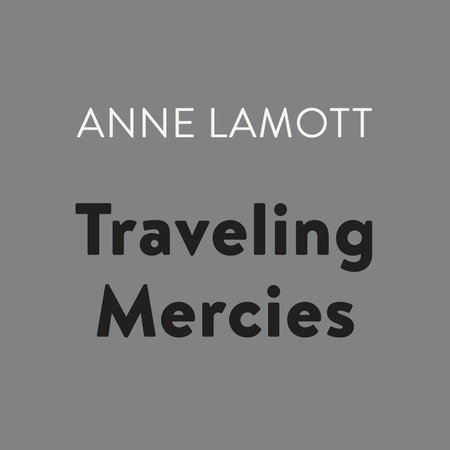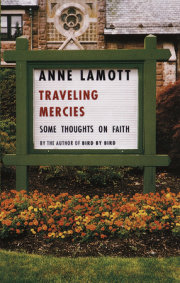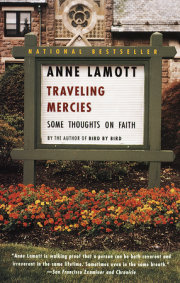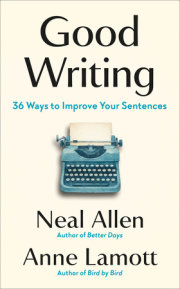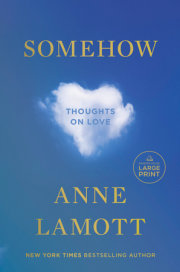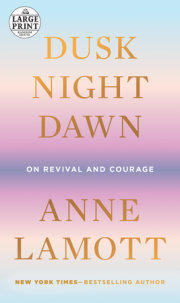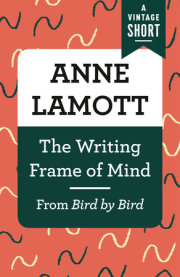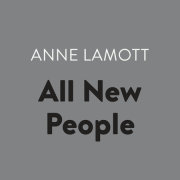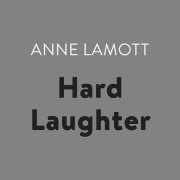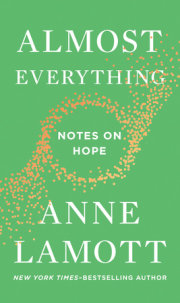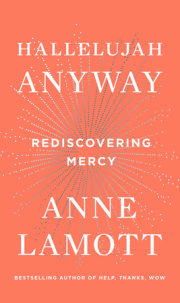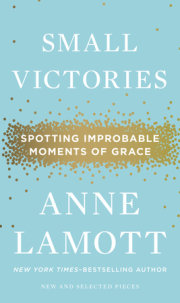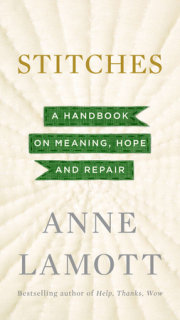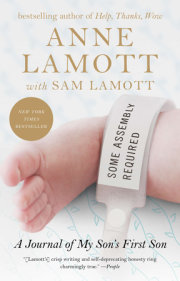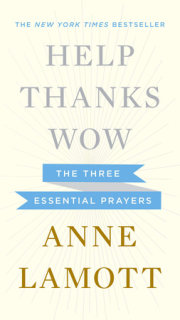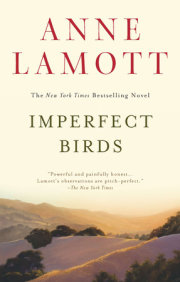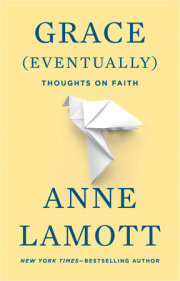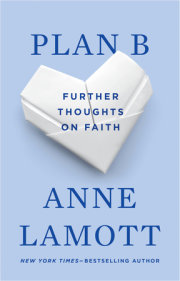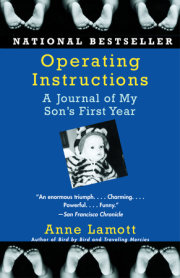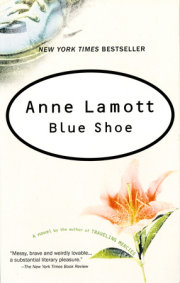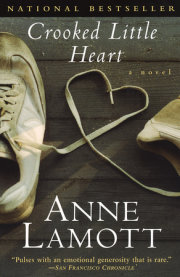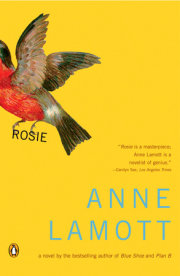My coming to faith did not start with a leap but rather a series of staggers from what seemed like one safe place to another. Like lily pads, round and green, these places summoned and then held me up while I grew. Each prepared me for the next leaf on which I would land, and in this way I moved across the swamp of doubt and fear. When I look back at some of these early resting places--the boisterous home of the Catholics, the soft armchair of the Christian Science mom, adoption by ardent Jews--I can see how flimsy and indirect a path they made. Yet each step brought me closer to the verdant pad of faith on which I somehow stay afloat today.
That One Ridiculous PalmThe railroad yard below our house was ringed in green, in grass and weeds and blackberry bushes and shoulder-high anise plants that smelled and tasted of licorice; this wreath of green, like a cell membrane, contained the tracks and the trains and the roundhouse, where engines were repaired. The buildings rose up out of the water on the other side of the bay, past Angel Island, past Alcatraz. You could see the Golden Gate Bridge over to the right behind Belvedere, where the richer people lived; the anise was said to have been brought over at the turn of the century by the Italians who gardened for the people of Belvedere.
Tiburon, where I grew up, used to be a working-class town where the trains still ran. Now mostly wealthy people live here. It means shark in Spanish, and there are small sharks in these parts. My father and shy Japanese fishermen used to catch leopard sharks in the cold green waters of the bay.
There was one palm tree at the western edge of the railroad yard, next to the stucco building of the superintendent--one tall incongruous palm tree that we kids thought was very glamorous but that the grown-ups referred to as "that ridiculous palm tree." It did not belong, was not in relationship to anything else in town. It was silent and comical, like Harpo Marx with a crazy hat of fronds.
We took our underpants off for older boys behind the blackberry bushes. They'd give us things--baseball cards, Sugar Babies. We chewed the stems off the anise plants and sucked on them, bit the ends off nasturtiums and drank the nectar.
When I was five and six, my best friend was a Catholic girl who lived about fifteen minutes away, on foot, from our house--kids walked alone all over town back then. I loved the Catholic family desperately. There were dozens of children in that family, or maybe it just felt that way, babies everywhere, babies crawling out from under sofas like dust bunnies. We only had three kids in our family; my brother John, who is two years older than me and didn't like me very much back then, and my brother Stevo, who is five years younger than me, whom I always adored, and who always loved me. My mother nursed him discreetly, while the Catholic mother wore each new baby on her breasts like a brooch. The Catholic mama was tall and gorgeous and wore heels to church and lots of makeup, like Sophia Loren, and she had big bosoms that she showed off in stylish V-necked dresses from the Sears catalog. My mother was not much of a dresser. Also, she was short, and did not believe in God. She was very political, though; both she and Dad were active early on in the civil rights movement. My parents and all their friends were yellow-dog Democrats, which is to say that they would have voted for an old yellow dog before they would have voted for a Republican.
I was raised by my parents to believe that you had a moral obligation to try to save the world. You sent money to the Red Cross, you registered people to vote, you marched in rallies, stood in vigils, picked up litter. My mother used to take the Greyhound out to Marin City, which was a terrible ghetto then, and volunteer in an after-school program for boys and girls from impoverished families. She tutored kids in reading while other grown-ups worked with them in sports. My mother majored in the classics in college. She always brought along little paper candy cups filled with the fanciest candies from Blum's or the City of Paris to give to the children after their lessons. It used to make my father mad that she'd buy such expensive candies, but this didn't stop her.
My Catholic friend and I used to spend hours sitting on the couch with the latest Sears catalog spread across our knees, pretending that we got whatever was on our side of the page. I played this game with anxiety and grief, always thinking that the better dresses and shoes were on my friend's pages and that I would have been OK if they had just been on mine--
and if I'd had her tall stylish mother, with the wonderful cleavage showing like the bottom of a baby in her low necklines. I knew I was not pretty because people were always making jokes about my looks. (Once, at a pizza joint, a stranger had included me in a collective reference to the Catholic children, and you would have thought from the parents' outrage that he had included a chimpanzee.) And I knew I was not OK because I got teased a lot by strangers or by big boys for having hair that was fuzzy and white. Also, I got migraines. I got my first one midway through kindergarten and had to lie down with my face on the cool linoleum in the back of the room until my father could come get me.
My friend and I gathered blackberries from the bushes in the train yard, and her mother made pies. She made apple pies too. We peeled each apple with precision, aiming for one long green spiral of peel, and my first memory of watching someone be beaten was on a night after we'd prepared apples for pie. My Catholic friend and I had been left with a baby-sitter and all those babies, and after we had sliced up and spiced the apples, we'd gone to bed without throwing out all those green snakes of peel, and I awoke with a start in the middle of the night because my friend's father was smacking her on the face and shoulders, fuming alcohol breath on the two of us in our one twin bed, raging that we were slobs, and I don't know how he knew to beat her instead of me because I don't remember there being any light on. We both cried in the dark, but then somehow we slept and in the morning when we woke the mother was frying up bacon, a baby slung over her shoulder, and the dad was happy and buoyant, thunderous in his praise of the pie now in the oven.
It was Sunday morning and I got to go to church with them. All the children got dressed up. The parents looked like movie stars, so handsome and young, carrying babies, shepherding the bigger kids, smooching in the car.
I loved every second of Catholic church. I loved the sickly sweet rotting-pomegranate smells of the incense. I loved the overwrought altar, the birdbath of holy water, the votive candles; I loved that there was a poor box, and the stations of the cross rendered in stained glass on the windows. I loved the curlicue angels in gold paint on the ceiling; I loved the woman selling holy cards. I loved the slutty older Catholic girls with their mean names, the ones with white lipstick and ratted hair that reeked of Aqua Net. I loved the drone of the priest intoning Latin. All that life surrounding you on all four sides
plus the ceiling--it was like a religious bus station. They had all that stuff holding them together, and they got to be so conceited because they were
Catholics.Looking back on the God my friend believed in, he seems a little erratic, not entirely unlike her father--God as borderline personality. It was like believing in the guy who ran the dime store, someone with a kind face but who was always running behind and had already heard every one of your lame excuses a dozen times before--why you didn't have a receipt, why you hadn't noticed the product's flaw before you bought it. This God could be loving and reassuring one minute, sure that you had potential, and then fiercely disappointed the next, noticing every little mistake and just in general what a fraud you really were. He was a God whom his children could talk to, confide in, and trust, unless his mood shifted suddenly and he decided instead to blow up Sodom and Gomorrah.
My father's folks had been Presbyterian missionaries who raised their kids in Tokyo, and my father despised Christianity. He called Presbyterians "God's frozen people." My mother went to midnight mass on Christmas Eve at the Episcopal church in town, but no one in our family believed in God--it was like we'd all signed some sort of loyalty oath early on, agreeing not to believe in God in deference to the pain of my father's cold Christian childhood. I went to church with my grandparents sometimes and I loved it. It slaked my thirst. But I pretended to think it was foolish, because that pleased my father. I lived for him. He was my first god.
My mother and her twin sister had come over from Liverpool with their mother after their father died, when they were twelve. My mother had a lifelong compassion for immigrants; she used to find people waiting for boats to their homeland or waiting for money to be wired from the East so that they could catch a bus home, and she'd bring them to stay with us until everything was straightened out. She and my aunt Pat had been confirmed as Episcopalians in England--I have their confirmation picture on my mantel, two dark-haired beauties of twelve or so in long white baptismal-style dresses. But that was the last of their religious affiliation. My aunt Pat married a Jew, with a large Jewish family in tow, but they were not really into Moses Jews; they were bagelly Jews. My closest cousin was bar mitzvahed, but other than accusing you of anti-Semitism if you refused second helpings of my uncle Millard's food, they might as well have been Canadians.
None of the adults in our circle believed. Believing meant that you were stupid. Ignorant people believed, uncouth people believed, and we were heavily couth. My dad was a writer, and my parents were intellectuals who went to the Newport Jazz festival every year for their vacation and listened to Monk and Mozart and the Modern Jazz Quartet. Everyone read all the time. Mt. Tamalpais loomed above us, and we hiked her windy trails many weekends, my dad with binoculars hanging around his neck because he was a serious bird-watcher. He worshiped in the church of Allen Ginsberg, at the Roger Tory Peterson Holiness Temple, the Tabernacle of Miles Davis.
We were raised to believe in books and music and nature. My mother played the piano most weekend nights, and all of us kids knew the words to almost every song in the
Fireside Book of Folk Songs. When my parents' friends came over on the weekends and everyone had a lot to drink, my mother played piano and everyone sang: English ballads, spirituals, union songs, "The Golden Vanity," "Joe Hill," "Bread and Roses."
Copyright © 2000 by Anne Lamott. All rights reserved. No part of this excerpt may be reproduced or reprinted without permission in writing from the publisher.

